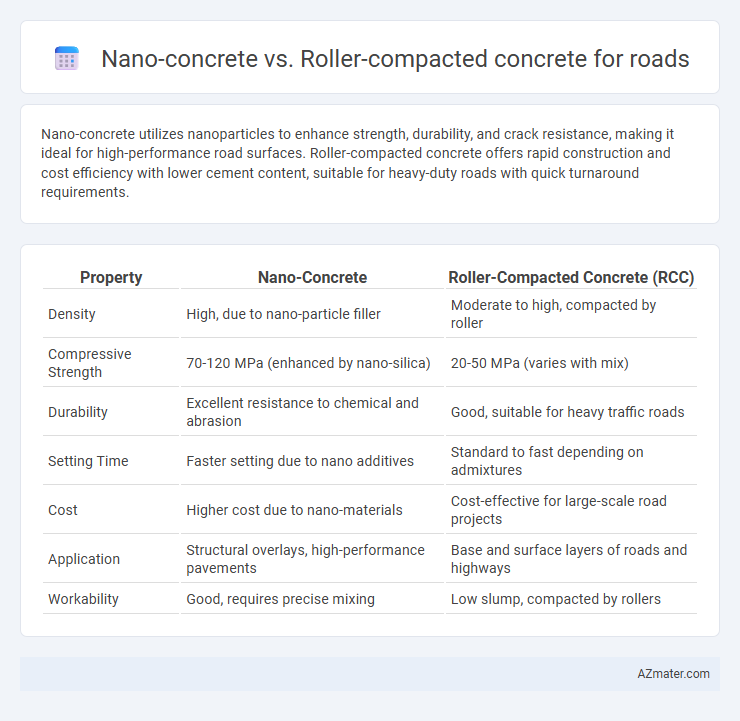Nano-concrete utilizes nanoparticles to enhance strength, durability, and crack resistance, making it ideal for high-performance road surfaces. Roller-compacted concrete offers rapid construction and cost efficiency with lower cement content, suitable for heavy-duty roads with quick turnaround requirements.
Table of Comparison
| Property | Nano-Concrete | Roller-Compacted Concrete (RCC) |
|---|---|---|
| Density | High, due to nano-particle filler | Moderate to high, compacted by roller |
| Compressive Strength | 70-120 MPa (enhanced by nano-silica) | 20-50 MPa (varies with mix) |
| Durability | Excellent resistance to chemical and abrasion | Good, suitable for heavy traffic roads |
| Setting Time | Faster setting due to nano additives | Standard to fast depending on admixtures |
| Cost | Higher cost due to nano-materials | Cost-effective for large-scale road projects |
| Application | Structural overlays, high-performance pavements | Base and surface layers of roads and highways |
| Workability | Good, requires precise mixing | Low slump, compacted by rollers |
Introduction to Nano-Concrete and Roller-Compacted Concrete
Nano-concrete incorporates nanoparticles like silica fume and nano-silica to enhance the microstructure, resulting in improved strength, durability, and resistance to environmental degradation. Roller-compacted concrete (RCC) is a dry-mix concrete placed and compacted with heavy rollers, known for its high density, rapid construction time, and reduced cost for road pavement applications. Both materials optimize road performance but differ significantly in composition, placement techniques, and curing methods.
Composition and Material Properties
Nano-concrete incorporates nanomaterials such as nano-silica and nano-titanium dioxide, enhancing hydration rate and increasing microstructure density, which results in superior compressive strength and durability compared to traditional concrete. Roller-compacted concrete (RCC) uses a drier mix with little to no slump, relying on mechanical compaction and a blend of coarse aggregate, cement, and water to achieve high structural stability and rapid setting suitable for road pavements. The nano-scale additives in nano-concrete optimize porosity and crack resistance, while RCC's optimized gradation and moisture content maximize load-bearing capacity and abrasion resistance.
Strength and Durability Comparison
Nano-concrete exhibits enhanced strength due to its optimized nanoparticle dispersion, resulting in a denser microstructure and superior crack resistance compared to roller-compacted concrete (RCC). While RCC offers rapid placement and cost efficiency with adequate durability for road bases, nano-concrete demonstrates significantly higher compressive strength, often exceeding 70 MPa, and improved resistance to abrasion and chemical attacks, making it more suitable for high-stress road surfaces. The advanced nano-modification improves long-term durability by minimizing porosity and enhancing bond strength, outperforming the conventional dense grading and compaction methods of roller-compacted concrete.
Construction Techniques and Equipment
Nano-concrete utilizes advanced nanomaterials that enhance bonding and strength at the microscopic level, requiring precision mixers and high-shear equipment for uniform dispersion during construction. Roller-compacted concrete (RCC) is placed using heavy-duty asphalt pavers followed by vibratory rollers, emphasizing rapid compaction and layer-by-layer stabilization without conventional formwork. The specialized equipment for RCC allows for faster construction on roads, while nano-concrete demands meticulous handling to optimize its nanomaterial properties and achieve superior durability.
Cost Analysis and Economic Feasibility
Nano-concrete offers enhanced durability and reduced maintenance costs due to its superior microstructure, making it economically feasible despite higher initial material expenses compared to traditional Roller-compacted concrete (RCC). RCC provides cost advantages through rapid construction and lower material costs, which benefit large-scale road projects requiring quick turnaround times and minimal equipment. Evaluating project-specific factors such as lifespan, traffic load, and environmental conditions is essential to determine the most cost-effective solution between nano-concrete's long-term performance and RCC's initial affordability.
Environmental Impact and Sustainability
Nano-concrete utilizes nanoparticles to significantly enhance concrete durability and reduce permeability, leading to longer-lasting road surfaces with less frequent repairs, which minimizes resource consumption and waste generation. Roller-compacted concrete (RCC) offers rapid construction with lower cement content and reduced water usage, resulting in decreased carbon emissions during production and installation, making it a sustainable choice for large-scale road projects. Both technologies contribute to environmental sustainability by improving efficiency and reducing the ecological footprint associated with traditional concrete road construction.
Performance in Various Road Conditions
Nano-concrete exhibits superior durability and enhanced microstructure, providing better resistance to cracking and improved load-bearing capacity under varying temperature and moisture conditions. Roller-compacted concrete (RCC) offers rapid construction and high compressive strength, performing well under heavy traffic but may experience compromised durability in freeze-thaw cycles compared to nano-concrete. Nano-concrete's improved adhesion and reduced porosity make it more suitable for highways exposed to harsh weather, while RCC is preferred for large-scale, cost-effective road base layers.
Maintenance and Lifecycle Considerations
Nano-concrete offers superior durability and reduced permeability compared to roller-compacted concrete (RCC), resulting in lower maintenance requirements and extended service life for road applications. RCC, while cost-effective and quicker to place, often demands more frequent repairs due to susceptibility to cracking and surface wear under heavy traffic loads. Evaluating lifecycle costs, nano-concrete's enhanced mechanical properties translate into prolonged intervals between rehabilitations, making it a more sustainable choice for long-term road infrastructure investment.
Application Suitability: Nano-Concrete vs RCC
Nano-concrete exhibits superior durability and enhanced mechanical properties, making it ideal for high-traffic urban roads that require rapid setting and long-term resilience. Roller-compacted concrete (RCC) is preferred for extensive highway pavements and heavy-duty industrial roads due to its cost-effectiveness and ease of large-scale application. The choice between nano-concrete and RCC depends on project-specific factors like traffic load intensity, budget constraints, and environmental conditions.
Future Trends and Innovations
Nano-concrete incorporates nanoparticles such as nano-silica and carbon nanotubes to enhance mechanical strength, durability, and self-healing properties, positioning it at the forefront of smart road construction innovations. Roller-compacted concrete (RCC) benefits from advancements in admixture technology and automation, improving its compaction efficiency and eco-friendly benefits through lower cement content and reduced carbon footprint. Future trends indicate a convergence of nanotechnology with RCC methods, aiming to develop hybrid materials that offer rapid construction, superior performance, and sustainable infrastructure solutions.

Infographic: Nano-concrete vs Roller-compacted concrete for Road
 azmater.com
azmater.com